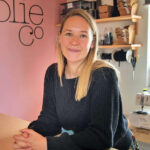Natural wine is a process of wine-making that goes back to ancient methods and back to basics. By using no synthetic herbicides, pesticides or fertilisers and only natural yeast on the grape to help with the fermentation process, natural wine is exactly what it states on the ‘tin’ – bottle – completely natural.
Unlike natural wine, organic wine is produced on an industrial scale and can be manipulated in the cellar. There is also a tolerated percentage of commercial chemicals that can be added to organic wines while still remaining within the range of “organic”.
I am lucky enough to be invited to an event hosted by Madame! Wine Shop in Aljezur, a natural wine bar and shop that hosts and encourages producers to showcase their wines at special events set up to allow more people to understand the story behind natural wine.

When I first walk into Madame!, it feels like I am instantly transported to an underground, exclusive club that could be in Berlin, London, Copenhagen, San Francisco – anywhere but the quiet back streets of Aljezur. It is refreshing to have this feeling.
I had the opportunity to meet Silvia Bastos and Nadir Bensmail, the duo who started the natural wine movement in Portugal when they opened the first wine bar in Lisbon in 2005, showcasing small-scale winemakers. They have now closed the bar and instead work with seven countries and 150 European wine producers, importing wines. Tonight they are showcasing the inaugural vintage of their project, Tomaralma.
Silvia says, “We have a humanist approach to our business, visiting all producers, and we feel more like an association than just importers. We travel a lot and drink a lot, which is great.” She laughs, “And we work a lot in the field”.
After some research, I understand that the natural wine bar scene is prevalent around the world and especially in America. It is associated with an alternative pop culture that seeks more than the elitism associated with the tradition of old-school wine experiences. The clientele is well educated – the ‘millennial bohemia’ – and are hardcore believers of going back to basics. Art plays a huge part in this scene as the bottles are labelled appropriately to encourage a cult following of each brand through not just the wine but also the label.
I imagine Madame! is very much like the bars in the cities I mentioned above. The owners, Ruben Menezes and Diane Grossot, have created a space that enhances an atmosphere of warmth and wealth with their designer touches, low-level lighting, vintage display of collectables, and a raw wooden structure that encases the entire surround of the bar, sort of giving the impression that you are inside a barrel of wine!
Madame! was initially called Madame Granel, and sold locally sourced organic products in bulk. They also stocked a small selection of natural wines and realised that selling and representing local natural wine producers was where they wanted their focus to be. The shop slowly ‘de-phrased’ as Diane puts it, and stocked less and less food and natural hygiene products and more natural wines. They are now a full natural wine bar with a wine club attached to it where you can access their collection during the week by collecting it at their farm in Aljezur.

Ruben was a son of a career diplomat and travelled more than most as a child. He then became a political advisor to a Member of the European Parliament in Brussels. He met Diane there 20 years ago while she was working for a non-profit organisation with EU funding. The experience of living in many different cities and countries resonates with the atmosphere they’ve created at Madame! As does their general disposition – intellectual, positive, and forward-thinking.
At the tasting, Silvia pours me a white wine that, to be honest, I don’t particularly like. It is very acidic and sharp and leaves a strong aftertaste in my mouth.
She explains that the wine I have tried comes from the “Fernão Pires grape, the most famous wine grape in Lisbon”. I try more of their range and enjoy a red wine that tastes woody and smooth. I am experiencing what is known as a “flight tasting” session, where four wines can be sampled for €15 per session. I listen intently to both Nadir and Silvia, who enthusiastically share stories behind the natural wine movement in Portugal and then realise, as with most of my articles, that I would need to write a book to explain everything I am being told.
It appears to me after this event that drinking natural wine is not just about the taste. It is about the journey through the bottle, the history around the production, the process, the labelling, and the culture that has formed behind the bottles – a culture of obsessive (in a good way) advocates of natural wine who want to do nothing more than re-educate the end-user on the way wine should be enjoyed and to de-construct preconceptions of how wine tastes.
The natural wine movement hopes to re-inform consumers to appreciate what wine actually tastes like when not tampered with and when it effectively comes straight from the ground to the glass.
The owners of Madame! and the duo I met there are beyond passionate when striving to explain to the consumer the whole story behind the bottle. Diane and Ruben are not just natural wine enthusiasts but activists for a bigger movement that is happening in the wine scene today.
I believe that it isn’t possible to deliver what they do without understanding the intricacies of customers, producers, and cultures, as what they are running is not a business or an entrepreneurial idea. It is a passion that goes beyond a fix to ‘earn money quickly’. It is more a life’s calling, especially for Diane, who comes from a family of winemakers in Fleys, France. She was brought up on an estate called Domaine Grossot that still produces Chablis wine (her sister Eve is now in charge of this estate).
Diane is a unique character, full of unfaltering knowledge that fascinates me. After a three-hour-long conversation with her, I’m re-educated on the behavioural psychology behind the whole process of cultural attitudes towards wine, the class system, and how this has an impact on how wine is bought and consumed.

From what I gather after our conversation, the entire culture around wine needs to be slowly broken down so that we can come back to the basic, pure essence and taste of the untampered grapevine.
Silvia is no different. She explains that a lot of the soils where estate wines were grown were losing their nutrients due to the overuse of chemicals. Wines stopped tasting like the owners of these vineyards remembered when the wine was being produced by their grandparents. She explains, “It was this lack of character and identity that made these producers think, ‘I have to go back to a wine that doesn’t have the chemicals in the vineyards and in the cellar’ “.
Commercialisation changed the industry and standards were sought that took the pureness away from wine and instead gave a very uniform and predictable taste, of course, all generated with precise laboratory formulas and a whole load of chemicals.
Dissatisfied by the lack of variety and taste that their grapes were now producing, vineyard owners who had inherited the estates from their parents were now interested in bringing back the methods of their ancestors and making wine taste how they remembered. She explains, “Actually, everyone thinks natural wine is a modern movement, but we are, in fact, going back to ancient methods”.
And so, from nostalgia, the natural wine movement slowly came into being again in Portugal. Unlike conventional wine, where yeast strains can be produced in laboratories to ensure consistency of taste from batch to batch, with natural wines, each batch of wine tastes slightly different and is produced on very small vineyards that typically grow biodynamically – meaning the earth is nourished with the help of compost from plants grown on the same soil and then broken down into compost and used again to feed the ground. Or it is grown on soil that carries no, or little trace, of chemicals from farming.
I am made aware that we are all so used to our favourite wine and how it should taste we don’t actually realise that we aren’t drinking ‘wine’ anymore but a combination of great marketing, amazing laboratory work, and more concoctions of chemicals than we care to think about.
Basically a bottled headache right there.
The morning after my natural wine-tasting experience, I wake up with trepidation, waiting for that banging headache that I am accustomed to with practically all consumption of wine – and instead, I just have a cloudy head that can’t wake up as quickly as normal. With very low sulfite levels and naturally occurring yeast to help with fermentation, natural wine is a winner for those of us who suffer from nasty hangovers.
If you truly love local Portuguese wine, then it is worth re-educating your palate because there is nothing more authentic than a natural wine-tasting experience. Follow Madame! and its wine club on Instagram for upcoming events.
Photos © Robert Hawcroft













